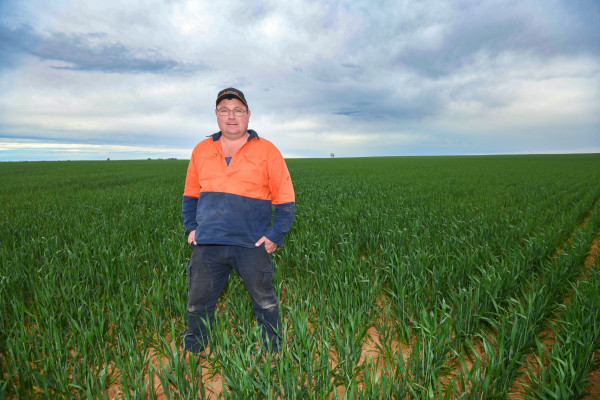CHRIS Hunt and his family don’t start seeding for a couple of weeks – but when they do it might actually seem like a bit of a break for them.
Because they have been going flat out around their 6200ha of arable country spraying, blanket and optical – three or four times in some cases as a result of the unusually wet summer leaving a serious green bridge to be managed.
But after a century of managing all the challenges of life in some pretty marginal cropping country, Chris reckons he and his father Colin and brother Anthony, have a pretty good handle on what they are doing.
Helped, in no small part Chris says, by their involvement with Mallee Sustainable Farming and his many years as a board member of the farmer-driven research and extension group.
“In many ways the value of MSF for me, and for us, has been getting involved in an organisation so focused on innovation and change,” Chris explains.
“The way I see it, if you think you’re static you’re not, you are actually going backwards if you are not going forwards.
“You don’t have to be right out there on the bleeding edge, but it makes a really big difference to what you do if you are at the leading edge.
“And that isn’t just for farming, it doesn’t matter what industry you are working in, if you simply sit still it all passes you by.”
Chris reckons one of the biggest things MSF helps him deal with are farming’s challenges.
He says no matter how clever you think you are, when you address one problem and make changes, or even successfully fix it, you invariably create a problem somewhere else.
“In farming we not only have to deal with challenges we haven’t even seen coming yet, we are also faced with old challenges which reappear from time to time – often because of something else you have done on the property,” Chris adds.
“I’m now based about 30km out of Mildura, but from one end of our aggregation to the other is today about 90km, so we clock up a few kilometres each day getting round that lot.
“We are primarily grain growers, with some sheep and a bit of domestic hay – although the sheep are already gone for the year as we prepare for seeding.
“In a normal year we are about 50 per cent cereal and 50 per cent non-cereal with our rotation strategy the key to our harvest each year – when we are working with just 275mm of annual rainfall and not the best soils in the world, we find innovation is everything.”
That includes the farms all being direct drilled, with no till, for the past 20 years, and an ongoing assessment of the break crops being used.
Chris says they rarely have cereal-on-cereal anywhere on the farm, with a combination of vetch, cereal, lentils, field peas and brown manure used to keep the paddocks as productive – and protected – as possible.
This also helps explain his willingness to step up with MSF and become a director.
“Being on the board has benefits at so many levels, including the interaction with other specialist directors, as well as building contacts and networks, as well as friendships,” Chris adds.
“And of course I am interested in anything to do with rotations, which helps highlight our potential.”
Chris says that while things are starting to dry off across the region, he still has plenty of subsoil moisture across his family farms, and is still targeting a start to seeding in the first week of April – rain, hail or shine.
Because there is no way his family will be waiting for rain before they start sowing.
“If there’s no rain we will dry sow, if necessary we are prepared to dry sow the whole crop,” he says.
“We seed by the calendar now, and it works for us – and one thing we have learnt is seeding in June definitely doesn’t work, whereas seeding by the calendar has been such a massive benefit for us – an innovation that really works.”
Mallee Sustainable Farming managing director Jenny Garonne says farmers across the Mallee region – in South Australia and NSW as well as Victoria – work with the group so they can access local, evidence-based knowledge and practical advice on no-till and reduced tillage systems, improved soil nutrition, crop rotation, agronomy, soil water efficiency, and soil microbiology.
Jenny says MSF has been, and still is, changing the face of farming in some of Australia’s most challenging cropping and livestock grazing country.
“We do that by working with our members, such as Chris, and industry experts to deliver the best in specialist agricultural research and development while also boosting farmers’ productivity and harvest yields,” she says.
















